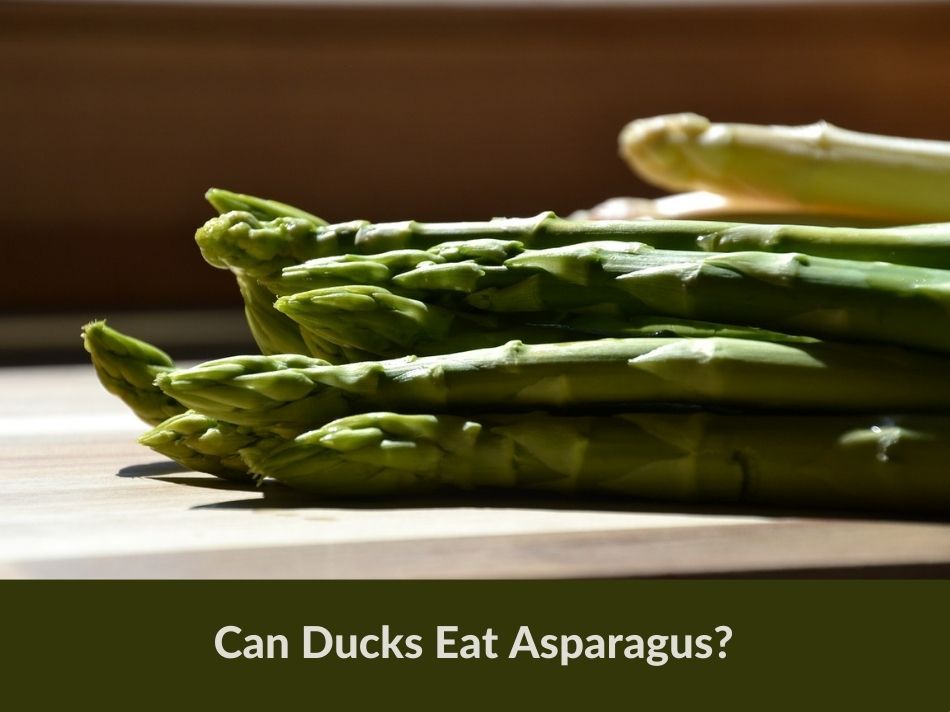Ducks, in their natural habitat, are omnivores. This means they have a varied diet ranging from small insects and aquatic plants to seeds and grains. They’re not too picky, and their diet often depends on what’s available in their environment. But, can ducks eat asparagus?
Yes, ducks can eat asparagus. But, like with all treats, it should be given in moderation. Asparagus is a healthy because it contains several minerals and vitamins that can benefit the duck’s overall health.
In this article, we’ll dive beak-first into the world of duck diets, specifically focusing on asparagus. From understanding a duck’s natural diet to the health benefits and potential risks of feeding them asparagus, we’ll cover it all.
How Often Can I Feed My Ducks Asparagus?
Asparagus should be considered a treat and should never replace a duck’s diet. You can offer asparagus to your ducks once or twice a week.
Can Ducklings Eat Asparagus?
Yes, ducklings can eat asparagus. It’s best to wait until the ducklings are 4-6 weeks old before introducing treats such as asparagus. Remember to chop them up into small fine pieces and always serve with water.
Asparagus Nutritional Value
Below is the nutritional value of 100 grams of asparagus.
- Calories: 20
- Protein: 2.2 g
- Carbs: 3.88 g
- Fat: 0.12 g
It also contains several vitamins and minerals as listed below.
- Vitamin A
- Vitamin C
- Vitamin E
- Vitamin K
- Thiamin (Vitamin B1)
- Riboflavin (Vitamin B2)
- Niacin (Vitamin B3)
- Vitamin B6
- Folate (Vitamin B9)
- Calcium
- Iron
- Magnesium
- Phosphorus
- Potassium
- Zinc
- Manganese
- Selenium
Is Asparagus Healthy for Ducks?
Asparagus holds a high nutritional value when it comes to vitamins and minerals. However, they are low in carbs, which makes them a perfect treat for ducks.
- Vitamin A: Supports duck vision and keeps their skin and feathers healthy.
- Vitamin C: Boosts stress reduction and acts as an antioxidant, especially during molting.
- Vitamin E: Aids duck muscle development and protects against cellular damage.
- Vitamin K: Ensures proper blood clotting, preventing bruises.
- Thiamin (Vitamin B1): Converts food to energy, giving ducks their pep.
- Riboflavin (Vitamin B2): Maintains shiny feathers and helps in energy release.
- Niacin (Vitamin B3): Aids digestion, skin health, and nerve function; prevents “black tongue.”
- Vitamin B6: Processes amino acids and bolsters duck immunity.
- Folate (Vitamin B9): Supports DNA synthesis and healthy duckling development.
- Calcium: Strengthens bones and ensures tough eggshells for laying ducks.
- Iron: Transports oxygen, keeping ducks active in ponds and the sky.
- Magnesium: Supports muscle function and enzyme activation for efficient paddling.
- Phosphorus: Works with calcium for strong bones and energy production.
- Potassium: Maintains muscle and nerve function and balances fluids.
- Zinc: Boosts immunity, feather growth, and fertility in ducks.
- Manganese: Aids bone formation, blood clotting, and inflammation reduction.
How To Feed Asparagus To Ducks
If you’re a caretaker or a park visitor wanting to treat ducks to some asparagus, here’s how you can do it safely:
- Clean the Asparagus: Ensure it’s free from pesticides and chemicals.
- Chop It Up: Cut the asparagus into small, bite-sized pieces to make it easier for the ducks to eat.
- Serve It Raw: Cooking can remove some of the nutrients, so it’s best to offer it raw.
- Avoid Seasonings: Ducks don’t need salt, pepper, or any other seasonings. Plain asparagus is best.
- Serve With Water: Always offer clean fresh water when feeding ducks. If you feed near lake or pond then toss the pieces into the water as this will mimic their natural foraging instincts.
For park visitors, it’s always best to check with park regulations before feeding wildlife. While asparagus is safe, many parks discourage feeding to ensure animals maintain a natural diet.
More Vegetables Ducks Can Eat
Vegetables, in particular, are a favorite treat for many ducks. If you’re curious about which veggies are duck-approved, here are a few to consider:
Each of these vegetables offers unique nutrients and benefits. So, the next time you’re looking to treat your feathered friends, consider these wholesome options!
Conclusion
In the grand pond of things, asparagus can be a delightful treat for our quacking companions. Caretakers and park visitors alike should always prioritize the health and well-being of ducks.
Offering a variety of safe treats, like asparagus, can be a fun way to interact with these feathered friends.
Disclaimer: The information in this article is for informational purposes only. I'm not an expert or a veterinarian.


